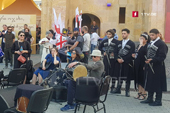
In the wake of IDAHOTB, part of Georgians march to protect 'day for purity of the family'
By Nika Gamtsemlidze
Monday, May 20
While the world celebrated the International Day Against Homophobia, Transphobia and Biphobia (IDAHOTB) on May 17, a part of Georgians marched in the streets to defend the purity of the family.
May 17 was declared as the day of Family Purity 5 years ago, in 2014, by the Georgian Orthodox Church. The decision was made after the events of May 17, 2013, when LGBTQI+ activists gathered in Tbilisi to defend the rights of the minority. The peaceful gathering was attacked by the right-wing and Orthodox church groups, resulting in mass violence that sparked international outrage.
This year, on May 17, part of the Georgians gathered in Tbilisi and regions to 'protect the Georgian family.' The Catholicos-Patriarch of Georgia, Ilia II said, 'the family is happy only if it is a legitimate family, which is made up of a man and a woman.'
A controversial concert was dedicated to the Family Purity day, where a number of singers refused to perform because the event was geared against the LGBTQI+ community in Georgia. Iliko Sukhishvili, the head of the Georgian National Ballet Sukhishvili, who participated in the concert, said that the celebrations should be held on May 17 every year, 'it would be good to give the country and the people a new composition annually.'
NGOs and queer activists in Georgia refused to celebrate IDAHOT due to the lack of safety guarantees from the public officials.
While the church celebrated the happiness of 'pure' Georgian families, the Public Defender released a special statement regarding the rights of LGBTQI+ people in Georgia. As the statement reads, LGBT rights defenders and their supporters are not safe to gather 'due to lack of security guarantees, which is a step backward on the path of improvement of the rights situation of the LGBT community and realization of freedom of expression and freedom of assembly.'
As the statement says, this day is dedicated to celebrating freedom, condemning violence, and is related to the removal of homosexuality from the list of diseases by the World Health Organization in 1990.
But, unfortunately, celebrating this day in Georgia has been related to violence in recent years. According to the Ombudsman statement, the lives of LGBTQI+ people have not become any better in Georgia, “homophobia is still strong in the society, which is why LGBT people suffer from oppression, discrimination and often become victims of violence.”
The international community has also expressed their support and solidarity towards the lesbian, gay, bisexual, transgender, queer, and intersex community in Georgia.
A joint statement was issued by the United Nations Resident Coordinator; the Ambassadors of the European Union (EU), Austria, France, Germany, Italy, the Netherlands, Slovenia, Sweden, and the United Kingdom; the Head of Mission of the United States; and the Head of the Council of Europe Office in Georgia on the occasion of IDAHOTB.
According to the statement, Georgia has come a long way in terms of human rights, since the national law prohibits all discrimination based on sexual orientation or gender identity and expression, but "the everyday reality for the LGBTQI+ community in Georgia is that these guarantees largely remain on paper. LGBTQI+ persons face discrimination, hate speech, and physical abuse, which violate their rights, deprive them of dignity, and push them to the margins of society.”
While the lives of LGBTQI+ people in Georgia remain critical, a significant segment of the society and public officials, influenced by the Georgian Orthodox Church, think that the 'traditional Georgian family' needs protection.


